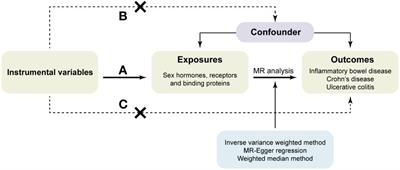Associations between sex hormones, receptors, binding proteins and inflammatory bowel disease: a Mendelian randomization study
Background: Gender differences existed in inflammatory bowel disease (IBD), including Crohn’s disease (CD) and ulcerative colitis (UC).

Observational studies have revealed associations between sex hormones and IBD, such as estrogen and testosterone. However, the exact relationship between these sex hormones and IBD is unclear. Method: Based on the genome-wide association studies data of eight sex hormones, two sex hormone receptors, sex hormone-binding globulin (SHBG), total IBD and its two subtypes, we performed a two-sample Mendelian randomization (MR) study to analyze their mutual relationship. For estradiol (E2), progesterone (PROG), bioavailable testosterone (BAT), total testosterone (TT) and SHBG, sex-stratified MR analyses were also performed. Inverse variance weighted method, MR-Egger regression and Weighted median method were used for causal analyses. Sensitivity analyses were conducted to test the stability of causal relationships. Besides, a reverse MR analysis was performed to estimate the reverse causation. Results: E2 (P=0.028) and TT (P=0.034) had protective effects on CD. Sex-stratified analyses revealed protective roles of E2 in males on total IBD (P=0.038) and CD (P=0.020). TT in females had protective effects on total IBD (P=0.025) and CD (P=0.029), and BAT in females decreased the risk of developing CD (P=0.047) and UC (P=0.036). Moreover, SHBG in males was also associated with a decreased risk of CD (P=0.021).
The reversed MR analysis showed that CD was negatively correlated with estrogen receptor (P=0.046). UC was negatively correlated with PROG in females (P=0.015) and positively correlated with SHBG levels in males (P=0.046). Conclusion: Findings of this study revealed the mutual causal associations between sex hormones and the risk of developing IBD.
Read the full article at the original website
References:
